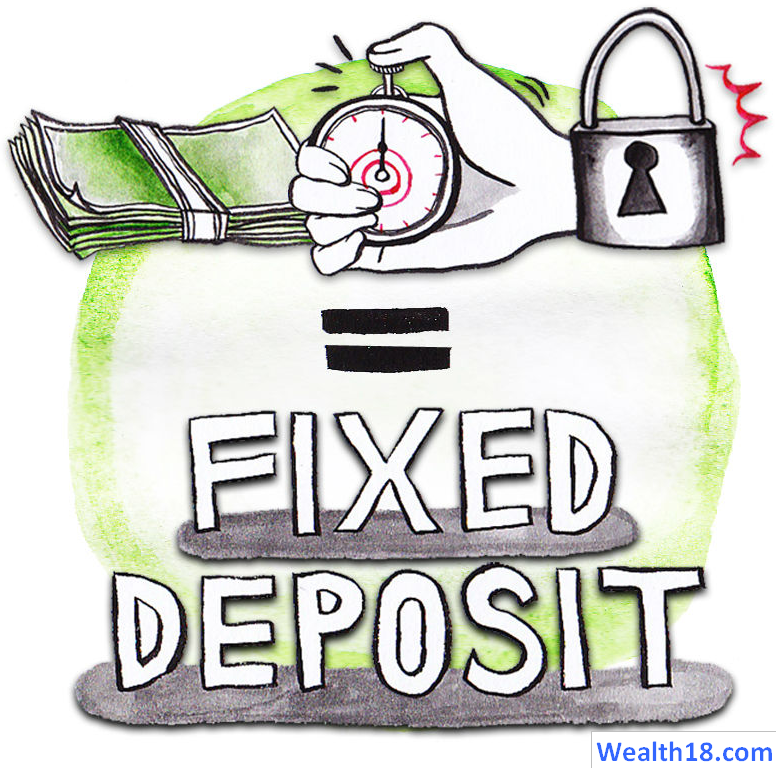You might be a business owner whose income keeps varying with time. Or you might be a person earning a regular salary. Whatever be the case, fixed income investments are a great way of earning some extra money. Additionally, the fact that you earn on a periodic basis ensures a steady flow of income. This can help you immensely, in case of an emergency.
With the abundance of fixed investments available, you might be confused about which one to choose from. Therefore, it’s crucial to know about the pros and cons of fixed income options.
Find out about fixed deposits here.

Fixed Deposits
Fixed deposits have an edge over regular savings account as they provide higher rates of interest on your investment. The rate of interest would be fixed for the tenure specified.
The interest rate may vary from bank to bank, so make a careful comparison before selecting one.
If you choose a longer term of deposit, you will, usually, get a higher interest rate on fd.
Furthermore, you have to specify the maturity period beforehand. You can choose from a period of 7 days upto 10 years.
You also have the option of withdrawing your money, before the maturity period, in case you need it for some emergency. However, you may have to pay a penalty fee for premature withdrawal.
Fixed deposits are considered one of the safest investments for earning extra income.
However, you need to know that income earned from fixed deposits are not tax-free. You have to file tax returns for them under Income from Other Sources.
The tax levied on the fixed deposit is charged according to the Income Tax Slab that you fall under. Thus, the tax varies from person to person as the slab rate varies. The range of Income Tax Slab falls between 0% to 30%.
Tax Deducted at Source is charged on your fixed deposit at a rate of 10%. However, if you don't have the PAN card details available, you have to pay at the rate of 20%. This ensures that people apply for a PAN card.
You can get away without paying TDS if the interest amount on your fixed deposit account for the year is less than Rs.10,000. As each bank calculates this interest amount separately, you can benefit by opening fixed deposit accounts in multiple banks.
Sometimes, discrepancies might come up. Even if the interest amount on your account didn't exceed the approved limit, you can be charged TDS. To ensure this doesn't happens, you can fill Form 15G/15H.
Advantages of a Fixed Deposit Account Over a Mutual Funds Account
The most important advantage, probably, about a Fixed Deposit account is that the returns are fixed. If you have a Mutual Funds account, you aren't assured of stable returns.
The Mutual Funds returns are affected by the market; so, they carry the risk of lower returns in times of economic crises. You might argue that MFs are high-yielding fixed-income investments during good times, but they cannot provide you the stability of a FD account.
Another advantage of a FD account is that you don't have to pay for any expense of depositing, whereas in Mutual Funds, you have to pay for some expense, depending on the type of MF.
You can see that amongst best investment plans, Fixed Deposits are a safe way of getting stable returns. They, clearly, have a lot of advantage over MF accounts. However, you should always make a thorough comparison and calculation before picking a fixed-income portfolio.


- business
- business loan
- chartered accountant loan
- chartered accountant loan
- Dental practice Loans
- Engineer Loan
- Engineer Loan
- Government Scheme
- GST
- Home Loan
- Insurance for Doctors
- Investment
- Loan
- loan against policy
- loan against policy
- loan against shares
- Medical equipment loan
- Medical practice
- merchant financing
- Personal Loan
- School Funding
- secured loans
- Securities
- Supply chain management
- TAN Number